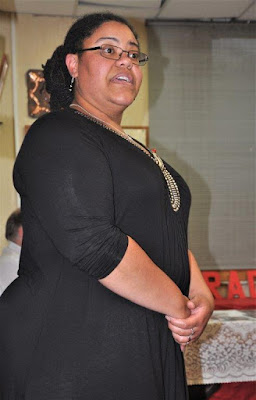TENS
OF thousands of trade union activists, peace and social justice campaigners
marched through London last Saturday from the Embankment to a massive rally in
Hyde Park to demand better pay and conditions for workers throughout the
country in what has been described as the biggest London march for many years.
It was organised by the TUC.
The workers were demanding a minimum wage
rise to £10 an hour, a ban on zero-hours contracts and higher funding for the
NHS, education and other public services.
Workers involved in current disputes
including those at restaurant chains TGI Fridays and McDonald’s joined the
march, along with railway workers striking to keep guards on trains, nurses,
ambulance crews, postmen, teachers, civil servants and cleaners.
TUC general secretary Frances O’Grady said
before the march started that workers have had enough of low pay, poor quality
jobs and constant cuts to public services.
She
added: “There is a new mood in the country. People have been very patient but
they are now demanding a new deal.”
Just before the march, the TUC published a
new report it had commissioned that showed that workers are suffering the
longest squeeze on wages in modern history.
It found workers were suffering the
biggest relative real wage loss since the Napoleonic Wars. Even after the Great
Depression and the Second World War, real wages recovered more quickly – in 10
years and seven years respectively.
A decade on from the financial crisis,
real wages are worth £24 a week less than in 2008 and are not forecast to
return to pre-crash levels until 2025, said the union organisation.
The TUC said the current stretch of wage
stagnation was the worst for 200 years. By 2025 the average worker will have
lost out by around £18,500 in real earnings, it was estimated.
Dave Ward, general secretary of the
Communication Workers Union, said it was the most important demonstration for
50 years. He said: “This is the start of a serious challenge for a new deal for
all workers.
“The world of work has become a
pressurised environment, based on a flexible labour market and bogus
self-employment.”
Marchers arrived in Hyde Park just as it
started to rain but that dampened no spirits. They gave a rapturous welcome to
Labour leader Jeremy Corbyn who addressed the growing crowd.
He pledged that a Labour government will
give workers “more power” to fight for higher pay. “Our whole movement exists
to challenge the powerful and stand up for the powerless,” he said.
“We want to see workers across whole
sectors, not just individual employers, get to bargain together to get the best
deal for the workforce in their industry.
“Why should bar staff and waiters not be
able to organise and support each other like London bus drivers can? It's time
for a fundamental shift in power in our country – from the few to the many.”
Corbyn won huge applause from the crowds
when he pledged the next Labour government would launch a ministry to guarantee
workers' rights.
He promised to "take rail mail and
water back into public ownership" and warned tax dodgers that a
"Labour government is coming after you. We will tax properly".
He added: "This demonstration today
is about workers’ rights, it is about collective endeavour but above all, it's
a declaration that we're around to campaign as long as it takes, to bring about
that social justice and that decency in society."

